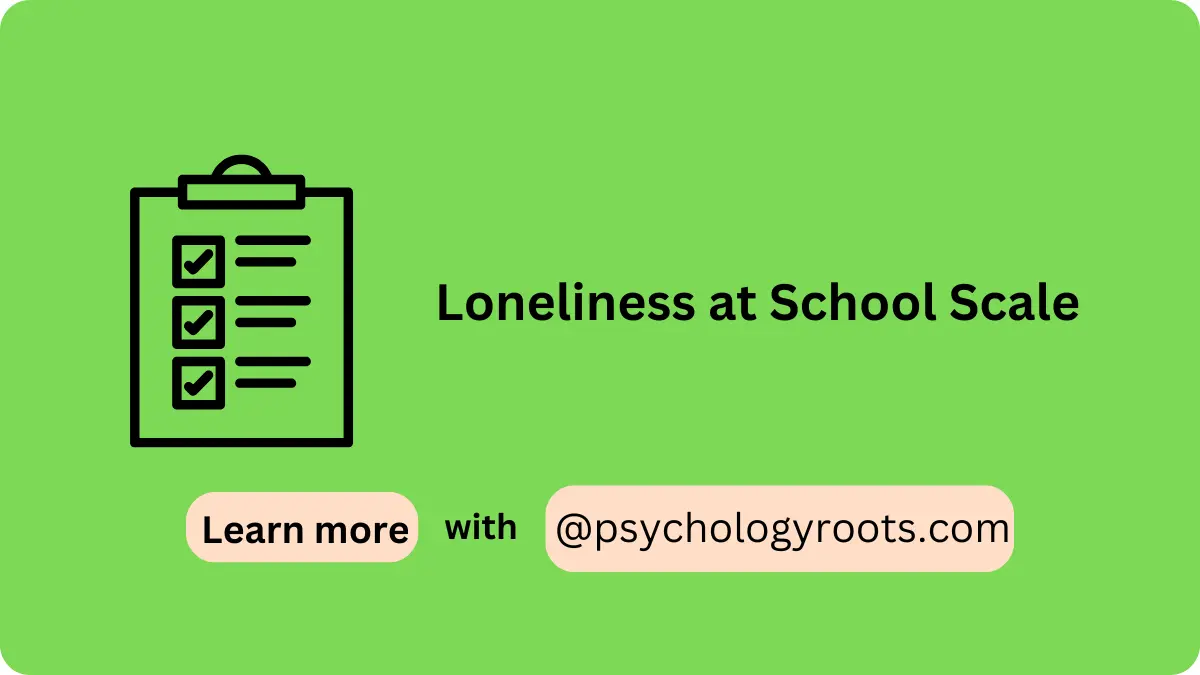Table of Contents
Loneliness at School Scale
Here in this post, we are sharing the “Loneliness at School Scale”. You can read psychometric and Author information. We have thousands of Scales and questionnaires in our collection (See Scales and Questionnaires). You can demand us any scale and questionnaires related to psychology through our community, and we will provide you with a short time. Keep visiting Psychology Roots.
About Loneliness at School Scale
Scale Name
Loneliness at School Scale
Author Details
Kochenderfer-Ladd and Wardrop
Translation Availability
English

Background/Description
The Loneliness at School Scale is a brief but effective tool designed to measure children’s feelings of loneliness and their perceived ability to build social connections in the school environment. It is derived from the Loneliness and Social Satisfaction Questionnaire by Cassidy and Asher (1992).
This scale is particularly valuable for understanding the social-emotional well-being of younger children, focusing on their interactions with peers and their sense of belonging in the school setting. It is a critical tool for identifying children at risk of social isolation, which can have long-term impacts on their academic and emotional development.
Administration, Scoring and Interpretation
- Target Population: Children aged 5–11 years (Grades K–5).
- Instructions for Administrators:
- Explain the purpose of the scale to the child in a simple and reassuring manner.
- Present each statement clearly and ensure the child understands the response options.
- Encourage honest answers without fear of judgment or consequences.
Reliability and Validity
- Reliability: Alpha reliability scores range between .77 and .89, demonstrating good internal consistency.
- Validity: The scale has been validated in school settings and aligns with the original Loneliness and Social Satisfaction Questionnaire to effectively measure loneliness among children.
Available Versions
05-Items
Reference
Kochenderfer‐Ladd, B., & Wardrop, J. L. (2001). Chronicity and instability of children’s peer victimization experiences as predictors of loneliness and social satisfaction trajectories. Child development, 72(1), 134-151.
Cassidy, J., & Asher, S. R. (1992). Loneliness and peer relations in young children. Child development, 63(2), 350-365.
Important Link
Scale File:
Frequently Asked Questions
Q1: What is the purpose of the Loneliness at School Scale?
The scale assesses children’s feelings of loneliness and their ability to build social connections within the school environment.
Q2: Who completes this scale?
The scale is completed by children, guided by an administrator (e.g., teacher or psychologist) to ensure understanding.
Q3: How is the scale scored?
Children respond to five items using a 3-point Likert scale. Scores are summed to provide a total loneliness score.
Q4: What does a higher score indicate?
Higher scores reflect greater loneliness and difficulty in forming social connections at school.
Q5: Is permission required to use this scale?
No, permission is not required to use this scale.
Disclaimer
Please note that Psychology Roots does not have the right to grant permission for the use of any psychological scales or assessments listed on its website. To use any scale or assessment, you must obtain permission directly from the author or translator of the tool. Psychology Roots provides information about various tools and their administration procedures, but it is your responsibility to obtain proper permissions before using any scale or assessment. If you need further information about an author’s contact details, please submit a query to the Psychology Roots team.
Help Us Improve This Article
Have you discovered an inaccuracy? We put out great effort to give accurate and scientifically trustworthy information to our readers. Please notify us if you discover any typographical or grammatical errors.
Make a comment. We acknowledge and appreciate your efforts.
Share With Us
If you have any scale or any material related to psychology kindly share it with us at psychologyroots@gmail.com. We help others on behalf of you.